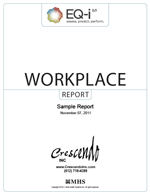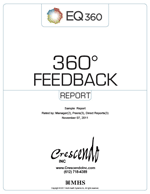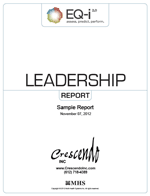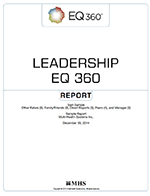EQ-i2.0 & EQ360 Assessments

Crescendo Inc. chose to work with the original EQ-i® (authored by Dr. Reuven Bar-On) assessment because it was the first validated assessment to measure social and emotional intelligence. Additionally, we found it to be a very versatile assessment tool which has allowed us to use it with leaders at all levels in organizations of different types (large, small, public and private.)
EQ-i2.0, published by MHS (Multi-Health Systems), builds on the original Bar-On Model. It reflects the dramatic shifts in cultural diversity, changing attitudes and value systems in North America that have occurred since the original EQ-i® release in 1997
Emotional Intelligence Defined
EQ-i2.0 defines Emotional Intelligence (EI) as...
"a set of emotional and social skills that influence the way we perceive and express ourselves, develop and maintain social relationships, cope with challenges and use emotional information in an effective and meaningful way."
Facts about the EQ-i 2.0
- Revised based on the original model by Dr. Reuven Bar-On, 1997
- It is considered reliable and valid based on numerous statistical analyses.
- The EQ-i 2.0 has been validated across age, gender & ethnicity.
- The North American norm group includes 4,000 self-reported ratings from adults residing in the U.S. and Canada. Data were gathered from all 50 U.S. states and the District of Columbia, as well as from all 10 Canadian Provinces.
- Race/ethnicity, education level and geographic region distributions are all within 4% of Census targets. This close match to the census means that EQ-i 2.0 is highly representative of the North American general population, thereby meeting the highest scientific standards for norm sample development.
- More than 1 million people have been tested worldwide.
EQ360 Assessment

The EQ360 is the companion assessment that measures the same emotional and social competencies as the EQ-i2.0 self-report, but from the perspective of those who work with the individual being assessed. The two assessments (EQ-i2.0 and EQ360) work together to provide a more complete view of an individual’s strengths and limitations, with the goal of helping organizations maximize their workforce potential.
Emotional Intelligence (EI) Practitioners use these tools in a variety of ways including recruitment, development, coaching, training, team-building and conflict resolution. Users of EQ-i2.0 can be confident that the scores generated by these assessments will be consistent and reliable. Decades of research prove the effectiveness of the EQ-i in measuring emotional intelligence, related concepts and relevant outcomes.
EQ-i2.0 Sample Reports
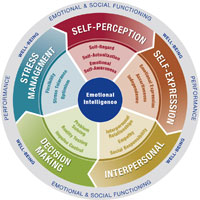 What EQ-i 2.0 and EQ360 Measure:
What EQ-i 2.0 and EQ360 Measure:
Self-Perception
Self-Regard - Respecting oneself while understanding and accepting one's strengths and weaknesses. Self-Regard is often associated with feelings of inner strength and self-confidence.
Self-Actualization - Persistently trying to improve oneself and engage in the pursuit of personally relevant and meaningful objectives that lead to a rich and enjoyable life.
Emotional Self-Awareness - Recognizing and understanding one's own emotions. This includes the ability to differentiate between subtleties in one's own emotions while understanding the cause of these emotions and the impact they have on the thoughts and actions of oneself and others.
Stress Management
Flexibility - Adapting emotions, thoughts and behaviors to unfamiliar, unpredictable, and dynamic circumstances or ideas.
Stress Tolerance - Coping with stressful or difficult situations and believing that one can manage or influence situations in a positive manner.
Optimism - Remaining hopeful and resilient, despite occasional setbacks. Optimism is an indicator of one's positive attitude and outlook on life.
Self-Expression
Emotional Expression - Openly expressing one's feelings verbally and non-verbally.
Assertiveness - Communicating feelings, beliefs and thoughts openly, and defending personal rights and values in a socially acceptable, non-offensive, and non-destructive manner.
Independence - Being self directed and free from emotional dependency on others. Decision-making, planning, and daily tasks are completed autonomously.
Decision Making
Problem Solving -Finding solutions to problems in situations where emotions are involved. Problem solving includes the ability to understand how emotions impact decision making.
Reality Testing - Remaining objective by seeing things as they really are. This capacity involves recognizing when emotions or personal bias can cause one to be less objective.
Impulse Control - Resisting or delaying an impulse, drive or temptation to act and involves avoiding rash behaviors and decision making.
Interpersonal
Interpersonal Relationships - Developing and maintaining mutually satisfying relationships that are characterized by trust and compassion.
Empathy - Recognizing, understanding, and appreciating how other people feel. Empathy involves being able to articulate your understanding of another person's perspective and behaving in a way that respects others' feelings.
Social Responsibility - Willingly contributing to society, to one's social groups, and generally to the welfare of others. Social Responsibility involves acting responsibly, having social consciousness, and showing concern for the greater community

